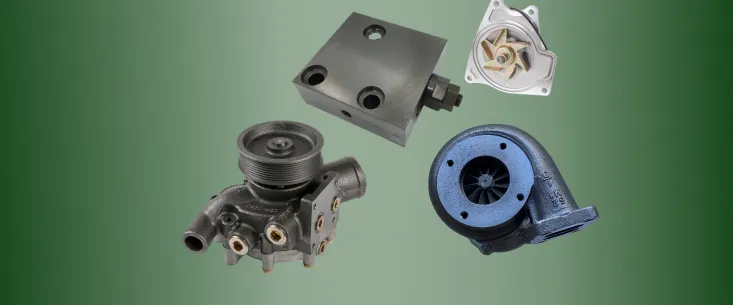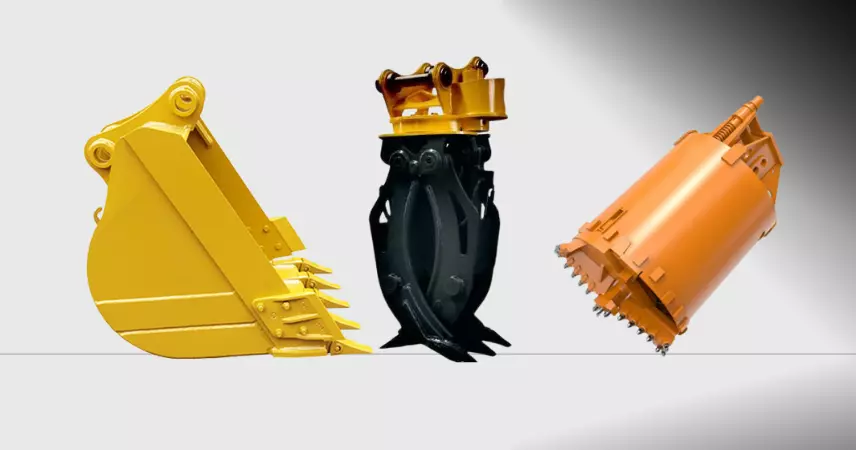+86-135 3388 0668
The Technology Behind Vickers Pumps and Their Role in Fluid Power Systems

Vickers pumps are widely regarded as one of the most reliable and efficient Hydraulic pumps on the market. Known for their durability, performance, and precision, Vickers pumps have earned a reputation as a leading choice in fluid power systems across a variety of industries, including manufacturing, aerospace, and construction. These pumps play a crucial role in converting mechanical energy into fluid energy, making them essential components in a wide array of applications.
1. What Are Vickers Pumps?
At its core, a Vickers pump is a hydraulic pump designed to convert mechanical energy, usually from a motor, into fluid energy. These pumps use pressure to circulate fluid through the hydraulic system, powering various tools and machinery. Vickers pumps are known for their versatility, being used in a range of applications, from heavy machinery to precision systems like robotics. Vickers, a well-established brand in fluid technology, is renowned for offering high-quality products that deliver maximum performance, efficiency, and longevity.
2. Types of Vickers Pumps

Vickers pumps come in different configurations and sizes to suit different needs. They generally fall into two broad categories: Gear pumps and piston pumps. Let’s explore the features and differences between these types:
Gear Pumps: Vickers gear pumps are among the simplest and most economical hydraulic pumps. They are typically used in systems requiring moderate pressures and flow rates. Gear pumps use two gears that mesh together, creating a chamber that traps fluid and forces it through the pump. This straightforward design ensures reliable operation with minimal maintenance.
Piston Pumps: Vickers piston pumps are more complex but offer a higher level of precision and efficiency. These pumps use pistons to move fluid through a chamber, allowing for more precise control over the pressure and flow rate. Piston pumps are typically used in applications that demand high-pressure operation, such as heavy machinery or aerospace applications. Vickers piston pumps come in both axial and radial designs, each suited to different types of systems.
Both types of pumps offer unique benefits, and selecting the right Vickers pump for a specific application depends on factors such as required flow rate, operating pressure, and the complexity of the hydraulic system.
3. The Advantages of Using Vickers Pumps
Several factors contribute to the popularity of Vickers pumps in the market. These include their reliability, long service life, and advanced engineering. Let’s take a closer look at the key advantages of using Vickers pumps:
Efficiency: One of the most significant benefits of Vickers pumps is their high efficiency. These pumps are engineered to minimize energy loss, ensuring that the power generated by the motor is effectively converted into fluid power. This efficiency helps reduce operating costs over time, making Vickers pumps a cost-effective choice for both small and large-scale applications.
Reliability and Durability: Vickers pumps are built to last. The components of these pumps are designed with precision and are made from high-quality materials, ensuring that they can withstand harsh operating conditions and continue to perform consistently over the years. This durability makes Vickers pumps ideal for industries where reliability is paramount, such as aerospace and heavy equipment manufacturing.
Flexibility: The versatility of Vickers pumps is another key selling point. With a range of different configurations and sizes available, these pumps can be customized to meet the specific needs of any application. Whether it’s a small hydraulic system in a mobile vehicle or a large industrial system in a manufacturing plant, Vickers offers a pump that fits the bill.
Quiet Operation: Vickers pumps are designed to operate with minimal noise. In many industrial settings, noise reduction is a significant consideration, particularly in environments where workers are exposed to loud machinery for extended periods. Vickers pumps offer quieter operation, helping create a more comfortable work environment.
Advanced Technology: Vickers has a long history of innovation in hydraulic technology. Their pumps incorporate advanced design features that improve overall performance, such as precision control over flow rates and pressure. These innovations help ensure that Vickers pumps provide the best possible service for users across a wide range of industries.
4. Applications of Vickers Pumps
The versatility of Vickers pumps is reflected in the wide range of industries that rely on them. Let’s take a look at some of the most common applications:
Industrial Manufacturing: In industrial settings, Vickers pumps are used to power machinery like injection molding machines, presses, and machine tools. The precision and efficiency of Vickers pumps allow these machines to perform with high accuracy and consistency, making them ideal for tasks that require precision.
Aerospace and Defense: Vickers pumps are integral to the aerospace and defense sectors, where hydraulic systems are essential for powering aircraft, spacecraft, and military vehicles. The high-pressure capabilities and reliability of Vickers piston pumps make them suitable for these demanding applications, where performance is critical to safety and success.
Construction Equipment: Heavy machinery such as excavators, bulldozers, and cranes rely on hydraulic systems to perform various tasks. Vickers pumps are often used in these applications due to their ability to deliver high flow rates and pressures, ensuring that the machines can operate effectively even in the most challenging environments.
Agricultural Equipment: Vickers pumps are also used in agricultural machinery like tractors, harvesters, and irrigation systems. The high durability of Vickers pumps ensures that they can withstand the tough conditions of agricultural work, while their efficiency helps reduce fuel consumption and maintenance costs.
Mobile Hydraulic Systems: Vickers pumps are a popular choice for mobile hydraulic systems found in vehicles such as trucks, buses, and off-road vehicles. These pumps provide the necessary power for lifting, steering, and other hydraulic functions that are crucial for the operation of these vehicles.
Why Vickers Pumps are a Top Choice for Hydraulic Systems and Their Future in Innovation
As we move further into the 21st century, the demand for more efficient and environmentally friendly hydraulic systems continues to grow. Vickers pumps remain at the forefront of this evolution, thanks to their ability to combine innovation with dependability. This part will explore why Vickers pumps continue to be a top choice for hydraulic systems and what the future holds for this iconic brand.
5. Innovations in Vickers Pumps
Vickers has continually pushed the envelope when it comes to pump design, and their commitment to innovation is one of the reasons they remain a leader in the fluid power industry. Some of the most notable advancements in Vickers pump technology include:
Variable Displacement Technology: One of the most exciting innovations in Vickers pumps is the use of variable displacement technology. This feature allows users to adjust the output flow of the pump based on the needs of the system. This provides a level of flexibility and efficiency that is unmatched in many other types of hydraulic pumps. By adjusting the flow rate, variable displacement pumps can save energy and reduce operating costs, which is a critical factor in industries looking to minimize their environmental impact.
Integration with Smart Systems: With the rise of the Internet of Things (IoT) and smart technology, Vickers pumps have evolved to integrate with digital control systems. These systems allow operators to monitor the performance of the pump remotely, making it easier to identify issues before they become critical. Real-time data on pump performance, including flow rate, pressure, and temperature, can help prevent downtime and improve maintenance practices.
Improved Sealing and Efficiency: Advances in sealing technology have led to improvements in the overall efficiency and longevity of Vickers pumps. Newer seals are designed to withstand higher pressures and temperatures, reducing the likelihood of leaks and ensuring the system operates smoothly for longer periods. These seals also help improve energy efficiency by minimizing fluid loss, making Vickers pumps even more cost-effective and environmentally friendly.
Compact Design: As industries strive to reduce the size and weight of their equipment, Vickers has responded by designing more compact and lightweight pumps. Despite their smaller size, these pumps still deliver the same level of performance and efficiency as their larger counterparts, making them ideal for applications where space and weight are critical factors.
6. Environmental Impact and Sustainability
In today’s world, environmental sustainability is a growing concern for businesses and industries alike. Hydraulic systems are no exception, and companies are increasingly looking for ways to reduce their environmental footprint. Vickers pumps, with their energy-efficient designs and low maintenance requirements, play an important role in helping industries achieve their sustainability goals.
Energy Efficiency: The high efficiency of Vickers pumps means that they consume less energy to perform the same amount of work compared to less efficient pumps. This not only reduces operating costs but also minimizes the environmental impact of hydraulic systems by lowering energy consumption.
Reduced Fluid Leaks: The durable seals and advanced construction of Vickers pumps reduce the likelihood of fluid leaks, which can have detrimental effects on the environment. This contributes to more sustainable operations, as it prevents contamination and the waste of valuable hydraulic fluids.
Longer Service Life: Because Vickers pumps are designed to last longer than many other types of pumps, they help reduce the frequency of replacements and the environmental impact associated with manufacturing and disposing of hydraulic components.
7. The Future of Vickers Pumps
Looking to the future, Vickers pumps are poised to continue their dominance in the hydraulic pump industry. As industries evolve, the demand for pumps that can handle higher pressures, more complex systems, and greater efficiency will only increase. Vickers is already well-positioned to meet these demands with ongoing innovations in pump design, materials, and smart technology integration.
As industries adopt more automated and smart technologies, Vickers pumps will likely become a crucial part of these systems, providing the reliability and performance necessary for seamless operation. With a focus on reducing energy consumption, improving efficiency, and enhancing system integration, Vickers pumps will continue to play an integral role in shaping the future of fluid power systems.
Vickers pumps have proven themselves as the gold standard in hydraulic pump technology. With their combination of innovation, efficiency, and reliability, Vickers pumps are well-suited for a variety of industries, from manufacturing and aerospace to construction and agriculture. As the demand for smarter, more efficient systems grows, Vickers pumps will remain a top choice for companies seeking to optimize their hydraulic systems. The future is bright for Vickers, and their ongoing commitment to innovation ensures that their pumps will continue to provide unmatched performance for years to come.
Search
Blog & News